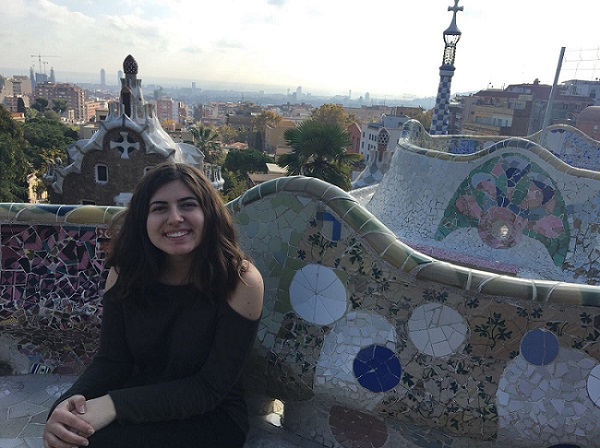Defining disability
Disability… what does it mean to you? To me, it represents my chronic medical condition I’ve had since I was 16, Crohn’s Disease, an Inflammatory Bowel Disease, which requires life-long treatment. Disability signifies living with an invisible illness, one in which my symptoms are not physically apparent by merely looking at me. Disability to me means not being able to participate in the same activities that my peers do, because of my illness. Having a disability represents feeling different than others and being limited to what you can or cannot do, despite our goals and aspirations. Being disabled means feeling misunderstood and fighting for normalcy and equality.
The sheer possibility of studying abroad as a person living with a chronic condition made me feel hopeful and excited, but also came with waves of stress and fear of not being able to have my medical needs properly accommodated while living abroad. I was very nervous as to how my medical care would be handled in a foreign country… how would I communicate my health issues in a different language? Will I be accommodated in the same way like back at home? Would I still be able to participate and do the same things as my peers? These were all raging questions that I was pondering before I departed for my semester abroad in Madrid as a person with a disability.
Accessibility for all
As soon as I found out that I was accepted into my study abroad program, I was put in contact with the program’s Dean of Students so I could set up my critical medical accommodations. Although I was very excited to embark on this international journey, I was also very aware of my health needs and restrictions, and wanted to ensure that I would adequately receive my care, despite living far from home in a different country. With an abundance of communication between my Gastroenterologist at home, the Dean of Student Life, and the student support staff onsite in Madrid, I was able to successfully arrange my intravenous infusion appointments as well as any other pertinent accommodations I needed to receive during my time abroad. I was impressed and overjoyed that I was able to participate in a study abroad program, just like the rest of my non-disabled peers, and that my urgent medical needs were all being accommodated. For example, I was given the option to have my own private room and private bathroom, for additional comfort and convenience; I was able to leave class intermittently to use the restroom if needed, and was not penalized if tardy or absent due to any flare-ups or medical appointments. There was also an amazing student support staff at my study center in Madrid, who helped me get to and from my medical appointments, did weekly check-ins with me, and made me feel comfortable and accommodated in my classes and in my residence hall. I was pleased to see that I was well taken care of and I didn’t have to feel any less than my peers.
For any international exchange and study abroad program, there is an increasing necessity for promoting accessibility for disabled and marginalized students. Most of us who have documented medical conditions often go through college not knowing what resources are available and how to access them. I knew people with existing conditions that assumed study abroad wasn’t an option for them because of the limitations of their medical illness; they completely ruled it out as a plausible opportunity for them, as they didn’t know how their medical needs would be accommodated. I think a lot of students with disabilities worry about the stressors of adapting to a different country with language barriers, different styles of medical care, and other environmental stressors, in addition to the anxiety and stress that comes with living with a chronic medical condition. It’s imperative for students to know what kind of resources are available during their study abroad semesters; knowing that kind of information about accessibility in advance might help students with disabilities make more informed decisions about whether or not studying abroad can be a potential option for them.
Advocating for inclusivity
During my semester abroad, I was still able to participate in activities and events alongside my peers, such as group field trips and cultural events (i.e., Flamenco and cooking classes), in addition to traveling by myself to several cities in Spain. It felt empowering and encouraging that I was able to participate in the same opportunities alongside my peers, as I did not have to feel any different or disconnected from the activities and experiences other students were engaging in. Although having a chronic condition presented its challenges at times, including random flare-ups, physical pain, and stress, I was still able to experience my program to its fullest degree, and accomplished everything I had sought out to do. Though my day-to-day struggle might have looked different than my peers’ on the program, I adapted to living in a foreign country with a chronic illness and I take pride that I was able to not let my condition hinder me from fully experiencing my study abroad semester. I’m proud that I was able to navigate the local public transportation system to get to my infusion appointments at the hospital, and even had to converse with the Spanish doctor and tell him about my medical history all in Spanish! These experiences taught me the valuable lesson of becoming an advocate for myself; my situation was difficult at times, but I learned to speak up and rely on myself to make sure that my health needs were being adequately understood and met.

Brie during one of her solo trips in Barcelona, Spain at Park Güel.
Studying abroad with a medical condition was not as ostracizing or alienating as I initially thought it would be, as I was greeted with an immense amount of support and guidance to help ensure I felt safe, comfortable, and accommodated during my program. I encourage any prospective study abroad student who may have a pre-existing medical condition to research what types of resources are available to you during your program abroad. Inter-cultural exchange programs are life-changing and character-building experiences that everyone deserves the right to encounter. It’s incredibly critical that all students have access to accommodations and support while abroad to best fit their medical needs, thus, making study abroad experiences equitable and accessible for all is of utmost importance. Whether that means having wheel-chair accessible housing and transportation available for students, hospitals and infusion centers students can easily access, private and convenient bathrooms available onsite, or simply kind and empathic student support staff who truly care about the well-being and health of their students, accessibility for students with disabilities can be seen in a multitude of ways. It’s truly imperative for international exchange programs to be inclusive and considerate to all types of students who wish to embark on study abroad experiences, as we all deserve the opportunity to be impacted by the world.









